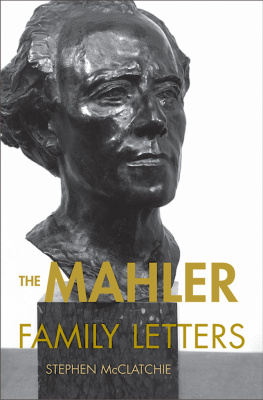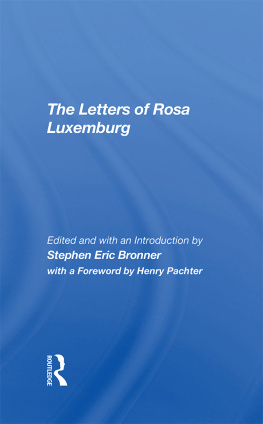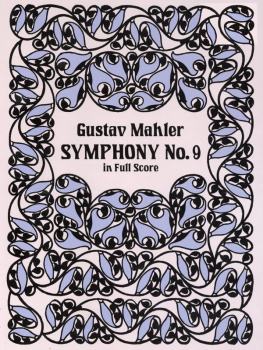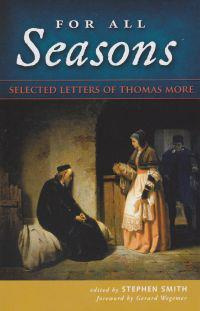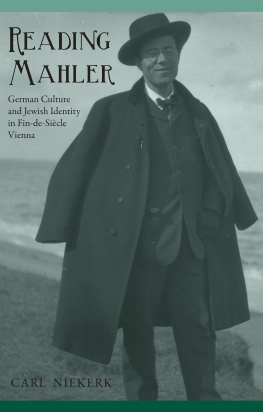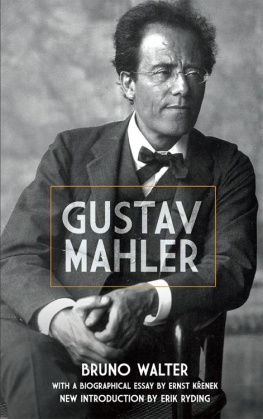McClatchie Stephen - The Mahler Family Letters
Here you can read online McClatchie Stephen - The Mahler Family Letters full text of the book (entire story) in english for free. Download pdf and epub, get meaning, cover and reviews about this ebook. year: 2006, publisher: OxfordUP, genre: Home and family. Description of the work, (preface) as well as reviews are available. Best literature library LitArk.com created for fans of good reading and offers a wide selection of genres:
Romance novel
Science fiction
Adventure
Detective
Science
History
Home and family
Prose
Art
Politics
Computer
Non-fiction
Religion
Business
Children
Humor
Choose a favorite category and find really read worthwhile books. Enjoy immersion in the world of imagination, feel the emotions of the characters or learn something new for yourself, make an fascinating discovery.
- Book:The Mahler Family Letters
- Author:
- Publisher:OxfordUP
- Genre:
- Year:2006
- Rating:3 / 5
- Favourites:Add to favourites
- Your mark:
- 60
- 1
- 2
- 3
- 4
- 5
The Mahler Family Letters: summary, description and annotation
We offer to read an annotation, description, summary or preface (depends on what the author of the book "The Mahler Family Letters" wrote himself). If you haven't found the necessary information about the book — write in the comments, we will try to find it.
The Mahler Family Letters — read online for free the complete book (whole text) full work
Below is the text of the book, divided by pages. System saving the place of the last page read, allows you to conveniently read the book "The Mahler Family Letters" online for free, without having to search again every time where you left off. Put a bookmark, and you can go to the page where you finished reading at any time.
Font size:
Interval:
Bookmark:

MAHLER FAMILY LETTERS
Edited, translated,
and annotated by
Stephen McClatchie


Oxford University Press, Inc., publishes works that further Oxford Universitys objective of excellence in research, scholarship, and education.
OxfordNew York
AucklandCape TownDar es SalaamHong KongKarachi
Kuala LumpurMadridMelbourneMexico CityNairobi
New DelhiShanghaiTaipeiToronto
With offices in
ArgentinaAustriaBrazilChileCzech RepublicFranceGreece
GuatemalaHungaryItalyJapanPolandPortugalSingapore
South KoreaSwitzerlandThailandTurkeyUkraineVietnam
Copyright 2006 by Oxford University Press, Inc.
Published by Oxford University Press, Inc.
198 Madison Avenue, New York, New York 10016
www.oup.com
First issued as an Oxford University Press paperback, 2009
Oxford is a registered trademark of Oxford University Press
All rights reserved. No part of this publication may be reproduced, stored in a retrieval system, or transmitted, in any form or by any means, electronic, mechanical, photocopying, recording, or otherwise, without the prior permission of Oxford University Press.
Library of Congress Cataloging-in-Publication Data
Mahler, Gustav, 18601911
[Correspondence. English. Selections]
The Mahler family letters / Stephen McClatchie
p. cm.
Includes index.
ISBN 978-0-19-534267-3
1. Mahler, Gustav, 18601911Correspondence.2. ComposersAustriaCorrespondence.3. Mahler family Correspondence.I. McClatchie, Stephen, 1965II. Title.
ML410.M23A413 2005
780'.92'2dc222004021483
To
Henry-Louis de La Grange
and
Alfred and Maria Ros, in memoriam
Within days of hearing that Oxford University Press would reissue my edition of the Mahler family letters in paperback, I learned of the existence of an unknown postcard from Mahler to Justine, from 25 August 1891. No 187a in this edition, it will be published, along with my brief introductory note, in Nachrichten zur Mahler-Forschung in the Autumn 2008 issue. I am grateful to Bill Ecker, of Harmonie Autographs and Music (New York), for informing me about this card.
I was first contacted by Mr. Ecker about Letter 506 and was able to facilitate its purchase by the University of Western Ontario. It has now been restored to its rightful place as part of the Mahler-Ros Collection (Shelfmark: S5-MJ-974[i]).
In 1983, Mrs. Maria Ros donated the core of the Mahler-Ros Collection to the Music Library at the University of Western Ontario in London, Ontario, Canada. In addition to musical manuscripts, memorabilia, and letters to her father-in-law, violinist Arnold Ros (who was married to Mahlers sister Justine), from leading composers and musicians, the donation included more than 500 unpublished letters from Gustav Mahler to his parents and siblings. The majority of these letters were written before the fall of 1894 and document such things as Mahlers burgeoning career as a conductor and composer, his parents illnesses and death, and the numerous trials and tribulations of his siblings Alois, Justine, Otto, and Emma. In the fall of 1894, the character of the letters changes when Justine and Emma begin living with Mahler in Hamburg and, later, Vienna, thus obviating the need to communicate by letter about quotidian matters. Instead, the later letters are written when Mahler is away from home, conducting his works or otherwise engaged. At this point, then, the coverage becomes markedly less thorough.
Many passages from these letters will not be totally unfamiliar to Mahler scholars. In the 1950s, Henry-Louis de La Grange travelled several times to London, Ontario, to stay with Alfred and Maria Ros and read the letters. He then paraphrased or used translated excerpts as the basis for his account of Mahlers earliest years and his family relationships. Mahler scholars can only be grateful to the Ross for their generosity in sharing these documents with him at the time. Nevertheless, when I began to work with the letters, it soon became clear that Ros had allowed La Grange to see only about half of the letters. It is difficult to determine on what basisif anyhis choices were made, as many of the letters used by La Grange are critical of Justine (who was, of course, Alfreds mother), and many of the letters that Ros did not show to him are completely innocuous.
In addition to all of the letters in the Mahler-Ros Collection, this edition includes a number of other family letters. Several letters from Mahler to his parents and sister Justine were sold by Alfred Ros during his lifetime. In most instances, he kept a photocopy of the letter; in one or two cases, however, I have had to rely on transcriptions made by La Grange. The letters to Emma Mahler were sold by her son Ernst Ros at auction by Sothebys in 1984 and are now dispersed. Fortunately, La Granges transcriptions of these letters are also in the Bibliothque Musicale Gustav Mahler. Copies of fourteen letters to Mahler from his parents and several of his siblings are found in the typescript of Alma Mahlers memoirs at the University of Pennsylvania. All but one of these letters were first published in translation in Selected Letters of Gustav Mahler, and are included here in my own translation with the permission of the University of Pennsylvania; the German edition of this volume is their first publication in the original language. Finally, the Mahler-Ros Collection contains several unpublished letters from Mahler to close family friends; I have included these in my notes to the family letters. (Admittedly, a number of the family letters are of staggering unimportanceletter 545 particularly comes to mind. As these are, without exception, short and few in number, they have been included in the interest of completeness.)
Mahler seldom dated his letters to his family. Once or twice he went through phases when he dated letters, once even admonishing his sister to always date her letters; unfortunately, some of his dates are demonstrably incorrecteven as much as a year off. As few envelopes have survived, a significant challenge has been to establish dates for the letters. Many may be dated on the basis of a performance mentioned in the letters.all of the letters in the 1950s. Consequently, he made some understandable errors in dating the letters that he did use (these errors are generally not noted in my annotations).
When the letters were donated to the University of Western Ontario, they were in twenty-one manila envelopes, likely as they had been stored in the vault of the Bank of Montreal downtown. While the arrangement of the letters was not chronological, there were nevertheless pockets of chronology; at times, this helped me to determine, for example, that a letter belongs to the Budapest years as opposed to the Hamburg years. (The first element of the shelfmark for each letter refers to the envelope, thus E3-MJ-113 is a letter to Justine from the third envelope; the last number is the unique accession number for each item.) I have also examined the paper (type and watermark) used in each letter. In a few instances, based on the use of a type of paper found only between two years, I have been able to assign a likely date.
In assigning dates to the letters, I have relied on the type of evidence described above, as well as the internal evidence of the letters themselves. I have also read many hundreds of unpublished letters from Mahler in search of references connected to the family letters, often with great success. As a result, there are only a few letters that cannot be dated with reasonable certainty; these undated letters are found at the end of each chapter.
Font size:
Interval:
Bookmark:
Similar books «The Mahler Family Letters»
Look at similar books to The Mahler Family Letters. We have selected literature similar in name and meaning in the hope of providing readers with more options to find new, interesting, not yet read works.
Discussion, reviews of the book The Mahler Family Letters and just readers' own opinions. Leave your comments, write what you think about the work, its meaning or the main characters. Specify what exactly you liked and what you didn't like, and why you think so.

